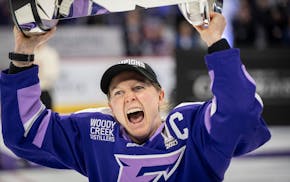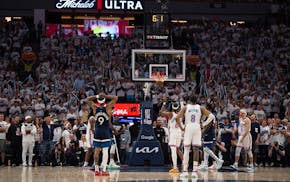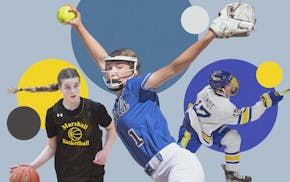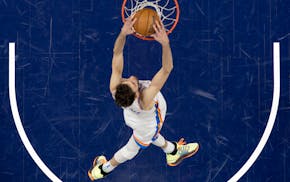Marcus Foligno was spent.
The Wild were in the preseason, practice had already eclipsed an hour, and the drills were challenging — battling for pucks and 3-on-2s.
"These training camp practices are tough," Foligno said.
Not even the lights going off stopped the session.
"We still kept going," captain Jared Spurgeon recalled.
But what did bring the action to a halt was players slacking off the last few minutes.
That's when John Hynes spoke up, their coach telling them this had to "get corrected" now. Later, after he skated off the ice, it dawned on Foligno that Hynes was right.
"This is the stuff that separates winners from losers," Foligno said. "It's teams that are willing to just do everything perfect for the longest and if you say, 'Hey, it's too hard. I want to take it easy here, and I'm just going to go through the motions,' that's when you get bit."
Back then the Wild didn't know what was awaiting them — surgery for superstar Kirill Kaprizov, injuries to all but one of their defensemen and only eight games at full strength — but the message they heard in camp set the tone for their response, and Hynes delivering it was just the beginning of him steering the Wild through a tumultuous season that impressively if not improbably continues Sunday with Game 1 between the Wild and Vegas in a best-of-seven playoff series.
His leadership has shown up in the Wild's X's and O's and how Hynes communicates with players but also in his presence: A comedian between games who sends memes in his family's group chat, Hynes is the serious and stoic poker face behind the bench, and that poise under pressure reinforced the consistency that helped the Wild through the adversity.
"You have to be very focused on the demeanor, what they need, that you're steady," Hynes said. "When you pop with some emotion, sometimes it's, 'OK, we deserved it,' or, 'Let's go,' or, 'I get it,' where if it's always like that, I don't know if they totally trust you."
Teammate to coach
Hynes, 50, has been honing his coaching chops since he finished playing.
He was a walk-on at Boston University, the Rhode Island native on the brink of more opportunity as a senior under legendary coach Jack Parker when he suffered a career-ending ruptured disc in his neck on a hit.
At BU, Hynes wanted to teach and coach high school hockey, so he stuck around as a graduate assistant and received his teaching degree.
"It was natural for him right away," said Wild assistant GM and former BU player Chris Kelleher. "That's a hard thing to do: The year before he was our teammate, basically, with us in the dorms. So it was a hard transition, but he handled it great."
Hynes wasn't so sure any more about teaching, but he knew he wanted to coach.
He went on to have stints with USA Hockey's national team development program, including as a head coach, collegiately — he met his wife, Sarah, while he was an assistant at Wisconsin — and for Pittsburgh's minor league affiliate.
"He's a total hockey junkie," said Sarah, who remained in Tennessee this season while their second of three daughters finishes high school. (Hynes has left the Saint Paul Hotel for a house his family will move into during the summer.)
Eventually, the NHL became Hynes' target, and he took over New Jersey's rebuild before guiding Nashville to the playoffs in three of his four seasons.
After the Predators fired Hynes in 2023, Wild President of Hockey Operations Bill Guerin made his own coaching change, replacing Dean Evason with Hynes last season following a miserable start. The Wild never recovered and missed the playoffs, but it was clear they were improving under Hynes' style.
What's meaningful to Guerin is how Hynes makes connections and handles the mental side of the game.
Both areas, how the Wild are on the ice and between the ears, are why the Wild passed this season's tests.
"It's easy to be a good coach when things are going great, and you got a healthy team, and you're rolling," Guerin said. "That's easy. How are you when things don't look great? Who's flipping out and playing the blame game, or who's just facing it head-on and trying to lead the team through it?"
Style points
Hynes wasn't frustrated this season by the 214 man-games lost to injury: He focused on what he could control.
"In the beginning of the year, when it's, 'OK a guy's out, a guy's out,' you're like, 'Aww,' " he said. "But then when it was just happening and happening and happening, it was just like, 'OK, what's next?' "
The Wild were without Joel Eriksson Ek, Jonas Brodin, Jake Middleton and Spurgeon on multiple occasions. Mats Zuccarello missed a month and Brock Faber a week; same with goaltender Filip Gustavsson.
But after never trailing through their first six games, upstaging some of the best teams in the NHL and climbing to the top of the standings in mid-December, the Wild remained competitive despite their absences.
Why?
Because that's how their system is built to work.
When executed properly, the Wild play a scheme that is so predictable that it protects against mistakes because they're surrounded by options, and that support follows them all over the ice.
"It's sort of second nature when you go back for a puck or on a forecheck or certain situations," Spurgeon said.
Not only does this allow the Wild to play fast — "Structure doesn't take away from instinctual hockey," Hynes explained. "It actually accelerates it" — but when there's a breakdown, it's easily exposed. (Think of a warning light on a vehicle's dashboard.) The problem can then be fixed quickly, and that's essential since practice time wanes during an 82-game season.
This is what the Wild relied on as they soldiered on shorthanded, but there were still slip-ups — mostly while Kaprizov was recovering from surgery on a lingering lower-body injury.
Then, when Eriksson Ek was also on the mend, the Wild offense went on the fritz and their first-half lead dwindled until they had dropped into the Western Conference wild-card race after remaining ahead of the pack for so long. They didn't clinch a playoff berth until their last game, which was also the first time they had everyone healthy since Nov. 10; Kaprizov and Eriksson Ek finally rejoined the lineup with four games left in the regular season.
"I'm not going to lie to you," Foligno said. "It's mentally exhausting when you're being handcuffed throughout the season and you are looking around, you want to do more, and you're getting a little bit hindered because you don't have that edge, right? You're missing those top guys."
Message received
But the Wild didn't throw themselves a pity party, and Hynes' message stayed the same.
He still relayed the core values that shape his coaching philosophy: good habits, competitiveness (this includes the "choose your hard" theme that players have embraced this season) and playing smart to understand the game within the game.
"Players have said this to me: It can't just be, 'Work harder,' " Hynes said. "We're working hard. We can't get out of our own end, so how? A lot of times that's what I find at the NHL level: You need to be able to provide answers, whether it's in between games or in between periods."
He's read about how players learn, their attention spans and the different methods for communication.
Hynes prioritizes clarity and honesty, and when everyone's together, he doesn't want players to be defensive. So he emphasizes how to get better, and he's not big on raising his voice.
"I like to be able to respond to what the team needs at that moment," Hynes said. "Not what I need, what they need. I may want to yell and scream, but that's not what they need."
Early in the season, Hynes pulled aside new linemates Foligno and Yakov Trenin to get them on the same page.
"Just showing video," Foligno said. "There was no yelling match or close-the-door meeting. It was, 'Hey, listen, this is what we need more of from you guys, and this is how to get to it.' "
There's zero guesswork with Hynes.
"He was very clear about what my expectations are," said Devils star Nico Hischier, who played 2017-19 for Hynes. "When he felt like my game was going off, he was trying to tell me what I would need to go back to."
And again, Hynes filters his feelings and talks through situations with his coaching staff to tell the Wild players what they need to hear rather than what he wants to say.
"Usually when you meet with the team," he said, "it's never on a whim."
Fun and games
Not every discussion, though, is about hockey.
Hynes chats with players about their families and cracks jokes when they are in the theater room at Tria Rink in St. Paul.
"I'm actually a pretty chilled-out guy," he said.
Among his peers, he's known for his sense of humor and impressions.
"He's not imitating movie stars," said Parker, the former BU coach. "He's imitating people that we know in the coaching ranks, and he's got a great knack for that, too. He can get me going at the drop of a hat any time."
When Hynes was at the NTDP, he would go through what his colleagues called the cycle, which was Hynes carrying out a conversation as someone else.
"He could have been Rich Little if he'd gone in another direction," said Scott Monaghan, USA Hockey's assistant executive director of the NTDP and USA Hockey Arena.
There is more to Hynes than meets the eye, and the team sees the difference.
"He laughs," Foligno said. "He comes in the room and talks to the guys and gets to know you."
Amid all the change, Hynes was the constant, providing the Wild with stability, in tactics, tone and temperament.
"I'm not sure we'd still be where we are with the injuries if it wasn't for him and the staff," Kelleher said.
The stakes are going to intensify. The Wild are back in the playoffs as the first wild card to take on a contender in the Golden Knights that swept the regular-season series, but they're not about to reinvent themselves.
That's not in their nature — or Hynes'.
"The reason why you have that messaging and have the identity," Hynes said, "is when you get in these high-pressure situations, sometimes you don't play your best. But when you do, when you stay with it, it gives you the best chance to win, and that'll be our focus."

PWHL expansion to Seattle and Vancouver could shake up Frost's championship team

RandBall: 10 things to know about Minnesota sports today

Meet the best high school freshman athletes in Minnesota
![Anthony Edwards, Julius Randle and the Wolves were always a step behind the Thunder on Monday.
] CARLOS GONZALEZ • carlos.gonzalez@startribun](https://arc.stimg.co/startribunemedia/CJVGEXG7INGRNHAEH5TAVZQ24U.jpg?h=91&w=145&fit=crop&bg=999&crop=faces)
Podcast: Patrick Reusse on why he never thought the Wolves would win Game 4

